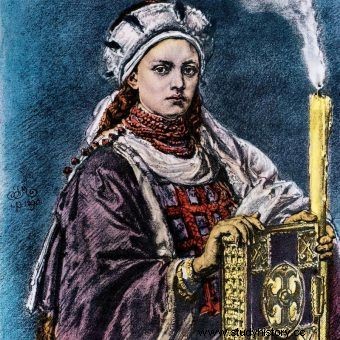
Dobrawa according to Jan Matejko.
Dobrawa
Duchess of the Piasts, wife of Mieszko I. She was probably born around 935 as the daughter of Bolesław I Srogi, the Czech ruler known for his cruelty. Most likely, she received a thorough education:her brother and sister Mlada were both scribes, so it can be assumed that she, too, could read. Some historians also speculate that in her youth, Dobrawa married an unknown political partner of her father.
In 965 - perhaps as a widow or divorcee - she married a pagan prince of Greater Poland, Mieszko I. She was then probably about thirty years old. As for the conditions of the 10th century and the Latin cultural circle, it was not an advanced age. Admittedly, the Czech chronicler Kosmas claimed that Dobrawa was advanced in the years, but its mention should be considered a groundless slander or a mistake.
According to the unanimous opinion of the sources, it was the new ruler who persuaded her husband to be baptized, resorting to deception and even blackmail for this purpose. In 967, she gave birth to her only son, Bolesław. She died in 977 under unknown circumstances. According to one of the hypotheses, she was buried under the floor of the chapel of the Mieszko's palace in Poznań.
She can be attributed an active participation in the life of the country - especially in its Christianization - and a significant influence on her husband. Kamil Janicki (the author of the only biography of Dobrawa) claims that it was through his wife Mieszko he could take over the military tactics previously used by his father Dobrawa and become acquainted with German court customs (which allowed him to gain the rank of an imperial friend and receive praise from the chronicler Thietmar, surprised by his good looks). On the other hand, the town of Sandomierz. whose origins date back to the times of Dobrawa, could have been associated with the duchess, as indicated by its name - undoubtedly of Czech provenance. It is also possible that it is with Dobrawa retinue and with the first missionaries - and not with Bona Sforza, which ruled several centuries later - vegetables known collectively as "Italian" reached Poland. Dobrawa was also a kind of guarantor of peace:it was only after her death that Mieszko entered into an armed conflict with the Czechs, which led to the occupation of Silesia and Lesser Poland.
Controversy is still raised by the way the duchess's name is written. Apart from the form Dobrawa the Dąbrówka variant is also in common use.
